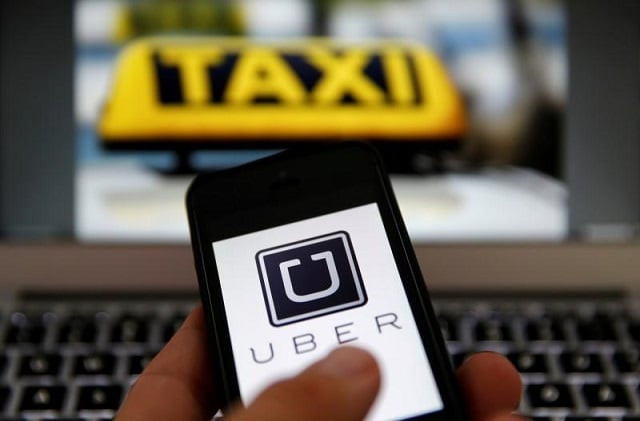Brazil approves bill regulating ride-hailing apps like Uber
Uber stated the bill would undermine its ability to operate in its second-biggest market

An illustration picture shows the logo of car-sharing service app Uber on a smartphone next to the picture of an official German taxi sign September 15, 2014.
PHOTO: REUTERS
Dara Khosrowshahi, who held talks with senior Brazilian officials in the capital Brasilia, had called on senators to remove rules in proposed legislation that would require Uber drivers to be licensed with their local municipalities, like taxis, and to use their own cars.
Uber has said that, if the bill was approved in its original form, it would undermine its ability to operate in Brazil, its second-biggest market, by making it too expensive and bureaucratic for many of its drivers.
That would harm the livelihoods of the 500,000 people driving for the company in Latin America’s largest economy, according to Uber.
Waymo seeks delay in self-driving trade secret trial against Uber
Following an appeal by Khosrowshahi for greater dialogue and more sensible regulation, senators agreed to amendments dropping requirements that drivers own their cars and have the same red number plates used by public transport vehicles like taxis.
However, lawmakers kept rules that make drivers subject to local city authorities for licensing, taxes and other rules. The bill must return to the lower house for final approval.
The regulatory crackdown in Brazil comes after authorities in London decided not to renew Uber’s operating license last month and highlights the legal threats mounting against its fast-growing foreign operations.
Khosrowshahi struck a conciliatory tone in an interview with a Brazilian newspaper, suggesting Uber was open to finding compromise with local lawmakers, a break in style with his pugnacious predecessor, Travis Kalanick.
“In the past we were a bit aggressive, but we have to understand that it’s not just about what we want and reach compromises,” Khosrowshahi told O Estado de S Paulo. “We are not against regulation. Regulating services like Uber is totally appropriate.”
Uber’s path to win back London: data, fines and fees
However, after talks with Finance Minister Henrique Meirelles, the executive said the future of the ride-hailing app in Brazil depended on the decisions made in Brasilia.
UBER, TAXI DRIVERS PROTEST
Hundreds of taxi and Uber drivers lined up on opposite sides of the esplanade in front of Brazil’s Congress to demonstrate for and against the bill.
Uber’s executive spokesman for Brazil, Fabio Sabba, told Reuters he was punched in the face by a taxi driver as he gave a media interview inside the Senate building.
Taxi drivers bused into Brasilia by unions said Uber’s lower fares had cut their income by almost half.
“Uber is destroying our age-old profession with unfair competition,” said Antonio Barbosa, who traveled 26 hours from the northern state of Bahia to protest.
In a study issued hours before the Senate was due to vote, Brazil’s antitrust regulator CADE found that car-hailing apps had improved the market for individual passenger transport by increasing competition. CADE said apps like Uber, Cabify and 99 should lead to less regulation rather than more.
Uber says sorry over London 'mistakes', but vows to appeal
In recent days, car-hailing companies such as Uber and Cabify had urged Brazilians by WhatsApp and social media to press their senators to vote against the measure, which was authored in the lower house by a congressman from the leftist Workers Party backed by taxi cooperatives and unions.
Cabify said the Senate had listened to the outpouring of messages on social media and 825,000 signatures handed in to Congress opposing the original bill.
“The amendments have brought a more balanced bill,” Cabify said in a statement.


















COMMENTS
Comments are moderated and generally will be posted if they are on-topic and not abusive.
For more information, please see our Comments FAQ